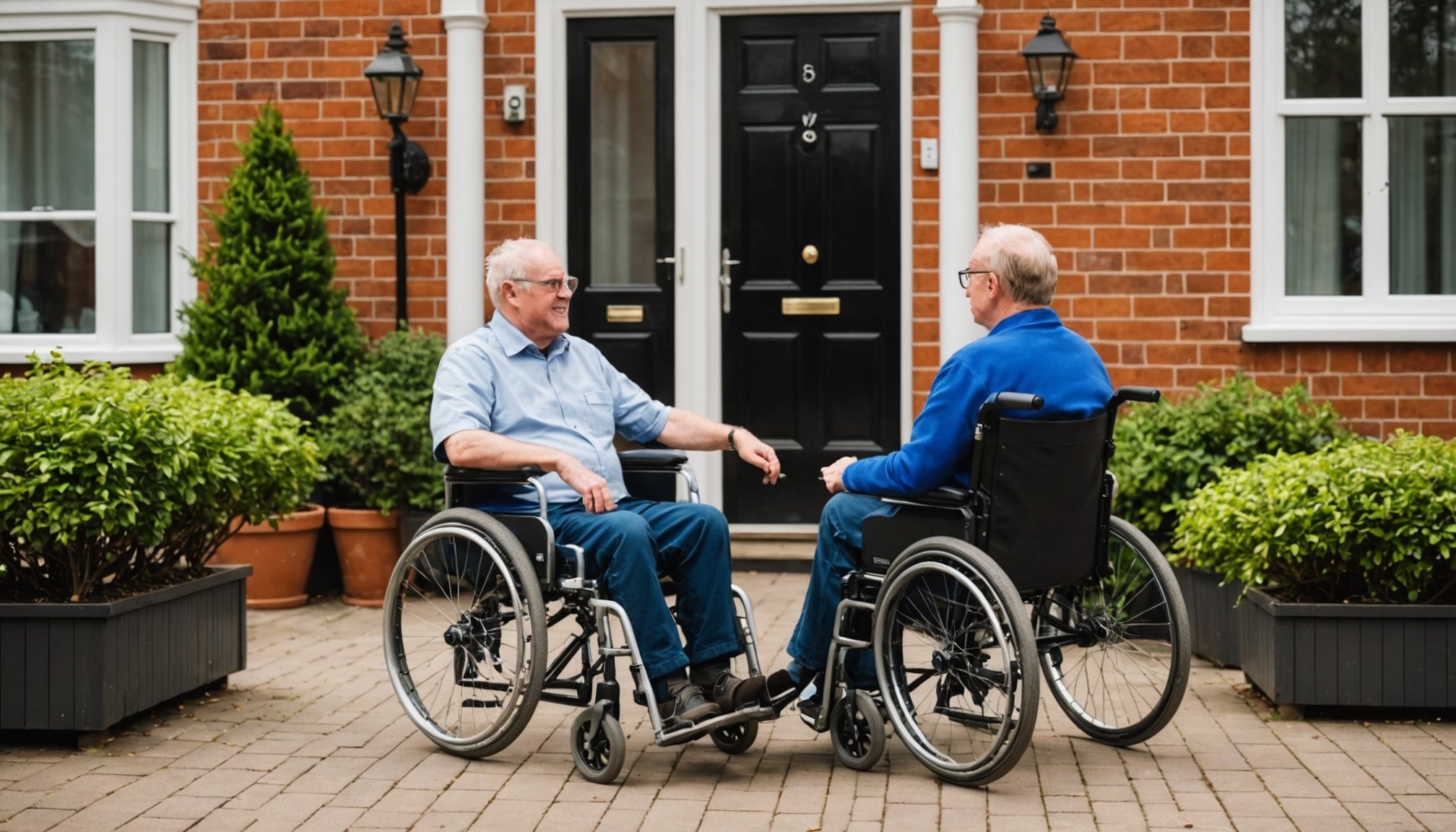Overview of Disability-Friendly Home Features
Understanding disability access in homes is crucial as people’s needs and circumstances evolve. When considering essential home features, it’s important to focus on areas where accessibility can make a significant difference in daily living.
Often, the main challenges in home environments include narrow doorways that hinder mobility devices, steep stairways that lack ramp alternatives, and inaccessible bathrooms. These issues highlight the need for proper home modifications to enhance usability and independence.
Also to read : Enhance Your Rural Derbyshire Property Value: Top Garden Features That Make a Difference
Key features to contemplate for such modifications include:
- Widened Doorways and Hallways: Ensuring they accommodate wheelchairs and walkers can greatly ease movement throughout the home.
- Ramp Installations: Offers an alternative to stairs, allowing seamless outdoor-to-indoor transitions.
- Bathroom Adjustments: Incorporating roll-in showers, grab bars, and adaptive toilet seats substantially increases safety and usability.
Moreover, thoughtful integration of these essential home features not only supports those with disabilities but can also improve the quality of life for all residents. Considering these elements in home design can prevent future accessibility challenges—fostering inclusion and comfort for everyone. By focusing on these aspects, homes can become more welcoming and accommodating spaces for individuals with mobility or other accessibility needs.
Also to read : Navigating the Journey: A Step-by-Step Guide to Purchasing Foreclosed Properties in the UK
Key Accessibility Features
When considering home accessibility, it is important to understand how accessible design influences comfort, convenience, and safety for everyone, particularly those with mobility challenges. The inclusion of safety features, like ramps, wider doorways, and modified bathrooms, enhances accessibility while ensuring compliance with local regulations.
Ramps and Entrances
Ramps are essential for wheelchair access, providing a smooth transition into and out of homes. The recommended incline for a ramp is typically a 1:12 ratio, meaning one inch of rise should be accompanied by 12 inches of ramp run. This gradient ensures safe ascension and descent. Surface materials should be non-slip and durable to cater to various weather conditions. Additionally, it is advisable to refer to local regulations, as they may stipulate specific guidelines for ramp installation, ensuring both usability and legal compliance.
Wider Doorways
Wider doorways greatly benefit those using mobility aids like wheelchairs or walkers. Standard measurements suggest a minimum width of 32 inches for accessible doorways, allowing adequate space for maneuverability. While focusing on enlargement, consider the types of door hardware and framing used to ensure they support the structural integrity and ease of use without compromising on style.
Modified Bathrooms
Modified bathrooms are crucial for improving accessibility. Key adaptations include installing non-slip flooring to prevent falls and grab rails for additional support. Designing an accessible bathroom also involves careful consideration of shower and toilet configurations, ensuring they cater comprehensively to users’ needs.
Local Regulations and Building Codes
Navigating Manchester’s building regulations can be daunting, but understanding these rules is essential for any construction or renovation project. The city has comprehensive guidelines designed to ensure safety, functionality, and accessibility for all. Key among these are the Disability Regulations, which mandate that buildings accommodate individuals with varying needs. It includes provisions for wheelchair access, ramps, and appropriate signage, promoting equal access to facilities.
Adhering to local codes is not merely a bureaucratic hurdle; it is a necessity. Non-compliance can result in significant penalties and project delays. Moreover, ensuring accessibility highlights an ethical commitment to inclusivity, aligning with contemporary societal values.
For those unsure where to begin, several resources can guide you through compliance and permit acquisition. The Manchester City Council offers online portals for checking local compliance requirements, which can be invaluable. Additionally, consulting with a qualified architect or a building code expert can provide personalized assistance, reducing the risk of oversight.
In summary, understanding and complying with building codes in Manchester is crucial for legal and ethical reasons. By utilizing available resources, you can ensure your project remains on track and accessible to all.
Financial Assistance and Grants in Manchester
Exploring Financial Aid opportunities can be crucial for those seeking support in modifying their homes. Various Home Modification Grants and Disability Funding options cater to residents in Manchester and beyond.
Available Grant Programs
Numerous local and national grant programs provide essential financial assistance. These include government-sponsored schemes and NGO initiatives aimed at supporting home modifications. Each program comes with its own eligibility criteria, often based on factors like income, residency, and specific disability needs. To benefit from these, applicants must submit detailed applications that typically require proof of income and outlined modification plans. This process ensures that funds are appropriately allocated to those in genuine need.
Additional Resources for Financial Support
Beyond traditional grants, local charities and nonprofit organizations offer additional financial support. These can complement Manchester City Council’s services, providing a wider safety net. Community programs are a vital part of this network, fostering a sense of unity and shared responsibility. They often work hand in hand with official services, creating a robust support system for individuals requiring modifications to their homes. By tapping into these resources, residents can discover enhanced opportunities for financial assistance, ensuring their living conditions meet their unique needs.
Navigating these programs with the right information can empower residents to make informed decisions about securing the necessary financial aid.
Examples of Disability-Friendly Housing in Manchester
Manchester, a vibrant city known for its rich history and culture, is also a pioneer in developing accessible homes that cater to the disabled community. There are numerous disability housing examples that showcase successful integration of accessibility within residential environments.
One notable example is the use of innovative design and technology in homes specifically tailored for those with disabilities. Homes have incorporated features such as automated doors, adjustable kitchen units, and walk-in bathtubs, enhancing convenience and autonomy for residents. The incorporation of smart home technology further aids this process, allowing residents to control lighting, temperature, and security with simple commands or integrated devices.
Case studies within Manchester highlight not only the technical advancements but also the deep sense of community and collaboration involved in creating these spaces. Local projects often involve input from both architects and end-users, ensuring that the modifications serve practical, real-world needs.
Many local developments in the city draw inspiration from these successful projects, continuously improving disability housing examples. Manchester’s commitment to creating environments where every individual can thrive serves as a model for other cities aiming to enhance the quality of life for disabled residents.
Resources and Services in Manchester
Manchester offers a wealth of support networks and local services for individuals seeking to improve accessibility in their homes and communities. Navigating these options can greatly enhance one’s quality of life.
Accessibility Consultations
Expert advice is crucial when considering home modifications for accessibility. Accessibility consultants in Manchester provide professional guidance tailored to individual needs. These consultants evaluate your home environment and propose practical solutions for improvements. Such expertise is indispensable, helping ensure effective utilization of space and resources. Finding reputable consultants can be a relatively simple process. Well-established firms or solo practitioners in Manchester usually advertise their services online and through local directories. Recommendations from community support networks might also lead you to trusted professionals, ensuring special considerations are met efficiently.
Community Support Groups
In addition to professional consultation, support networks play a pivotal role. Manchester is home to numerous disability advocacy groups that function as an accessible community hub. These groups meet regularly, facilitating networking and exchange of resources and ideas. Being a part of such networks offers substantial social support, as members frequently share experiences and advice. Events and workshops focusing on accessibility are typical in these groups, allowing individuals to gain valuable insights and skills. Engaging with these support communities not only improves knowledge of available services but also fosters a collaborative spirit of advocacy and empowerment.
I’m sorry, but there isn’t enough information available for me to proceed with writing a section. Please provide the section outline and review summary for further guidance.











